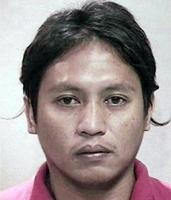Kho Jabing | |
|---|---|
 | |
| Born | 4 January 1984 |
| Died | 20 May 2016 (aged 32) |
| Cause of death | Execution by hanging |
| Other names |
|
| Conviction(s) | Murder under Section 300(c) of the Penal Code |
| Criminal penalty | Death |
| Accomplice(s) | Galing Anak Kujat (robbery with hurt); 18.5 years' imprisonment and 19 strokes of the cane |
| Details | |
| Victims | 1 |
| Date | 17 February 2008 |
| Country | Singapore |
Date apprehended | 26 February 2008 |
Kho Jabing[a][b] (4 January 1984 – 20 May 2016), later in life Muhammad Kho Abdullah,[c] was a Malaysian of mixed Chinese and Iban descent from Sarawak, Malaysia, who partnered with a friend to rob and murder a Chinese construction worker named Cao Ruyin in Singapore on 17 February 2008. While his accomplice was eventually jailed and caned for robbery, Kho Jabing was convicted of murder and sentenced to death on 30 July 2010, and lost his appeal on 24 May 2011.
Later, when the changes to Singapore's death penalty laws took effect in January 2013, Kho Jabing was granted a re-trial, and thus have his death sentence commuted to life imprisonment and 24 strokes of the cane on 14 August of that same year. However, on 14 January 2015, the life sentence was overturned and the death sentence was reinstated on Kho Jabing once again upon the prosecution's appeal. After a lengthy appeal process, and despite the public appeals for mercy on his life, Kho Jabing was finally put to death by long drop hanging[d] at 3.30 pm on 20 May 2016 for his crime.[e][2]
The prosecution's appeal in the case of Kho Jabing was also a landmark in Singapore's legal history, setting the main guiding principles for all judges in Singapore to decide where the discretionary death penalty is appropriate in future murder cases, which directly or indirectly affected both the sentencing and appeal outcomes of some murder cases that occurred in Singapore. Other than the death penalty issues in Singapore, Kho Jabing had also had an effect on the requirements of the Singaporean courts to reopen concluded criminal appeals and cases, which made its first effect on an unrelated capital case on 2 August 2017,[3] leading to the acquittal of 34-year-old Nigerian citizen and alleged drug trafficker Ilechukwu Uchechukwu Chukwudi on 17 September 2020.[4][5]
- ^ "Counsellor shares final moments with Kho Jabing". AsiaOne. 22 May 2016. Archived from the original on 6 July 2020. Retrieved 4 July 2020.
- ^ a b Lum, Selina (20 May 2016). "Convicted murderer Jabing Kho hanged after latest bid to escape gallows fails". The Straits Times. Archived from the original on 9 October 2020. Retrieved 18 May 2020.
- ^ Lum, Selina (2 August 2017). "Court of Appeal orders review of own judgment in drug-trafficking case". The Straits Times. Archived from the original on 12 April 2021. Retrieved 29 December 2020.
- ^ Lam, Lydia (17 September 2020). "Man acquitted again in drug trafficking case, escapes death penalty in new twist 9 years after the incident". The Straits Times. Archived from the original on 25 February 2021. Retrieved 29 December 2020.
- ^ "High profile S'pore court cases of 2020: Nigerian man cleared of drug trafficking after 9-year legal saga". The Straits Times. 21 December 2020. Archived from the original on 20 December 2020. Retrieved 29 December 2020.
Cite error: There are <ref group=lower-alpha> tags or {{efn}} templates on this page, but the references will not show without a {{reflist|group=lower-alpha}} template or {{notelist}} template (see the help page).